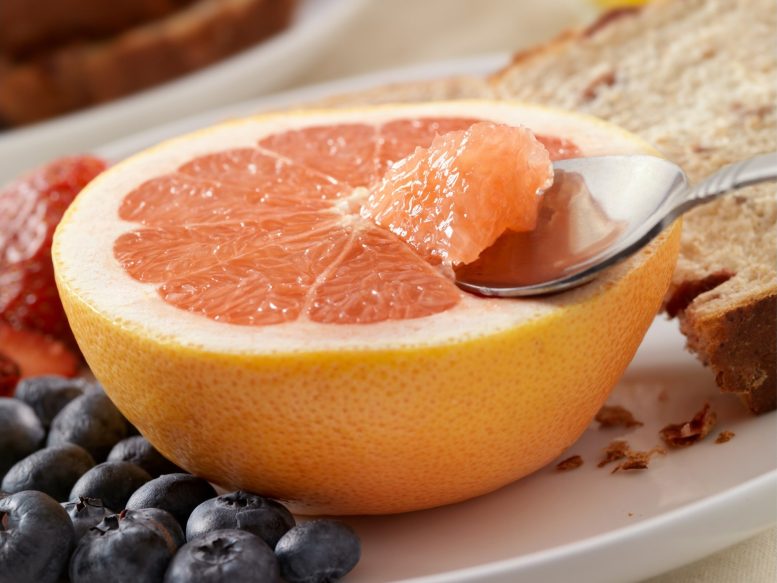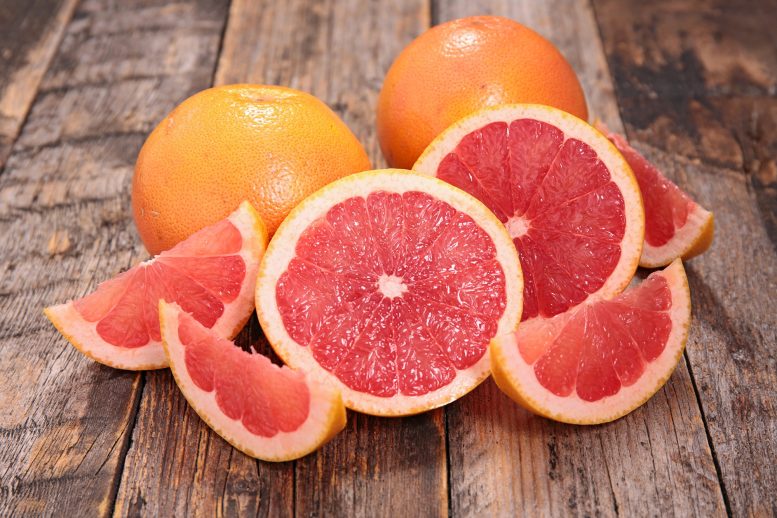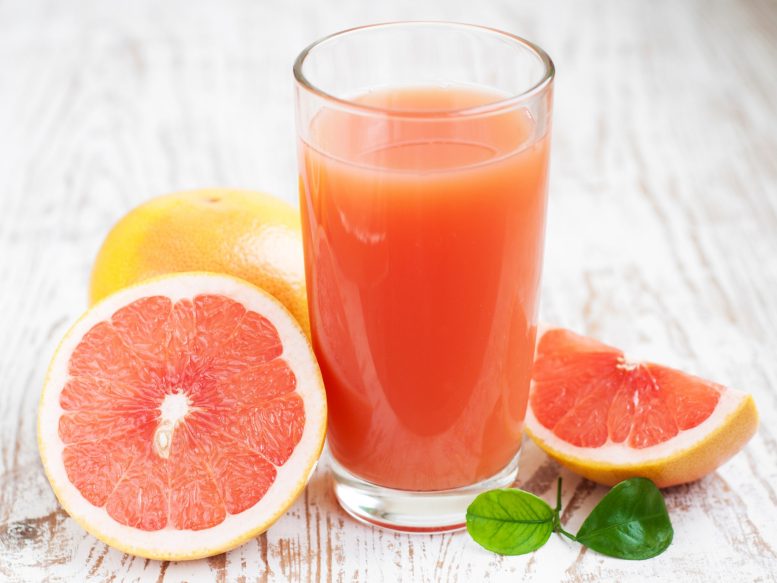
Grapefruits are loaded with nutrients and health benefits.
Grapefruits are one of those fruits that people either love or hate! But if they are to your taste, you could be giving your body a real boost by eating them regularly. All citrus fruits are good for you, but grapefruits are at the top of the pile regarding health benefits. Unfortunately, not everybody can eat grapefruit as it can interact with some medications. But, if you’re not in that boat, your body will thank you if you add a regular serving to your diet.
Grapefruit is Rich in Many Nutrients
Grapefruits are both high in nutrients and super low in calories. Fruits tend to have more calories than vegetables, but grapefruit contains less natural sugars than most fruits, making it one of the lowest-calorie choices available. Like all citrus fruits, they are rich in vitamin C, but the benefits don’t end there. They are a good source of fiber, vitamin A, thiamine, and folate. Grapefruits are also rich in antioxidants, which help to reduce inflammation throughout the body.[1]

Since grapefruit is low in calories, while high in fiber and water content, consuming it regularly could help you lose weight.
Grapefruit Can Help Improve Weight Loss
Studies have shown that adding grapefruit to a diet can significantly aid weight loss.[2] This benefit is partly due to the fiber content, which makes you feel fuller, the low calorific profile, and the high water content. Any food low in calories that satisfies your hunger is an excellent help when losing weight. So, while it won’t produce weight loss by itself, added to a balanced diet grapefruit will definitely improve your chances.
Grapefruit Improves Heart Health
Many studies have shown that grapefruit improves heart health and reduces the chances of many types of heart disease.[3] Grapefruit works by lowering cholesterol levels, particularly the LDL or ‘bad’ cholesterol. This benefit is partly due to the potassium found in grapefruit, which reduces blood pressure, and the high fiber content, which helps lower cholesterol. The high antioxidant content is also likely to protect against heart disease and stroke.[4]

Loaded with antioxidants, grapefruit may help prevent cancer.
Grapefruit is Full of Antioxidants
Antioxidants reduce inflammation by protecting your cells from attack by dangerous free radicals. Vitamin C, in particular, is a powerful antioxidant that can help prevent cancer.[5] Other antioxidants, such as beta-carotene, lycopene, and flavanones, help reduce the likelihood of certain cancers and slow tumors that may already be present.[6]
Grapefruit Reduces the Risk of Kidney Stones
If you’ve ever had kidney stones, you will know the agony they can cause! They form when waste builds up in the kidneys, crystallizing and blocking the urinary system. The main culprit of kidney stones is calcium oxalate. The citric acid found in grapefruits helps remove calcium from the body while also increasing the pH of urine, reducing kidney stone formation.[7]
[Editor’s Note: As mentioned in the comments of this article, research is not conclusive on the effect of grapefruit on kidney stones. Some studies find it beneficial, while others say it actually raises the risk. As stated in the abstract of this [7] study, “grapefruit was found to raise the risk of [kidney stone disease (KSD)] in epidemiological studies but had a protective role in smaller clinical studies.”]
If consuming grapefruit is safe for you, it makes an excellent addition to your diet. It can help in many aspects of your health but has particular benefits for heart health and reducing the risk of many forms of cancer. So, if you like the taste, you definitely should be adding more grapefruit to your diet.
References:
- “Grapefruit, raw, pink and red, all areas Nutrition Facts & Calories,” Nutrition Data.
nutritiondata.self.com/facts/fruits-and-fruit-juices/1905/2 - “The Health Benefits of Dietary Fibre” by Thomas M. Barber, Stefan Kabisch, Andreas F. H. Pfeiffer and Martin O. Weickert, 21 October 2020, Nutrients.
DOI: 10.3390/nu12103209 - “The effects of daily consumption of grapefruit on body weight, lipids, and blood pressure in healthy, overweight adults” by Caitlin A. Dow, Scott B. Going, Hsiao-Hui S. Chow, Bhimanagouda S. Patil and Cynthia A. Thomson, 10 February 2012, Metabolism.
DOI: 10.1016/j.metabol.2011.12.004 - “Fruits for Prevention and Treatment of Cardiovascular Diseases” by Cai-Ning Zhao, Xiao Meng, Ya Li, Sha Li, Qing Liu, Guo-Yi Tang and Hua-Bin Li, 13 June 2017, Nutrients.
DOI: 10.3390/nu9060598 - “Pro- and Antioxidant Effects of Vitamin C in Cancer in correspondence to Its Dietary and Pharmacological Concentrations” by Elzbieta Pawlowska, Joanna Szczepanska and Janusz Blasiak, 24 December 2019, Oxidative Medicine and Cellular Longevity.
DOI: 10.1155/2019/7286737 - “Flavanones: Citrus phytochemical with health-promoting properties” by Davide Barreca, Giuseppe Gattuso, Ersilia Bellocco, Antonella Calderaro, Domenico Trombetta, Antonella Smeriglio, Giuseppina Laganà, Maria Daglia, Silvia Meneghini and Seyed Mohammad Nabavi, 12 May 2017, BioFactors.
DOI: 10.1002/biof.1363 - “Role of Citrus Fruit Juices in Prevention of Kidney Stone Disease (KSD): A Narrative Review” by Yazeed Barghouthy and Bhaskar K. Somani, 17 November 2021, Nutrients.
DOI: 10.3390/nu13114117








“The citric acid found in grapefruits helps remove calcium from the body while also increasing the pH of urine, reducing kidney stone formation.[7]”
I wondered about this claim when I read it because I would expect that ingesting an acid [citric] should, if anything, lower the pH, NOT increase it. Upon reading the abstract of the reference [7], I find it contradicts the claims. To whit:
“The main outcome of interest was the association of citrus fruit juices with KSD [Kidney Stone Disease]. … Three large epidemiological studies found that grapefruit juice was a risk factor for stone formation, while orange juice did not increase the risk for KSD. Ten small prospective clinical studies found that orange, grapefruit, and lemon juices all increased urinary citrate levels. ONLY orange and grapefruit juices had an alkalinizing effect and while lemon juice has a protective effect by raising urinary citrate levels, it lacked a significant alkalinizing effect on urine pH. Orange juice and grapefruit juices significantly increased urinary oxalate levels, while orange juice also had a high carbohydrate content. Conclusion: While orange juice seems to play a protective role against stone formation, grapefruit was found to raise the risk of KSD in epidemiological studies but had a protective role in smaller clinical studies.”
I should add that while oxalate stones are probably most common, citrate stones are known to occur. It is probably best to eat a diverse diet. “Moderation in all things.”
Thank you for the comment. A note has been added to the article.
Sorry, but particularly grapefruits can be very unhealthy or even dangerous for certain people. Grapefruit contains a strong CYP3A4 enzyme inhibitor. This enzyme is important for metabolizing several medications and fatal interactions have been reported for astemizole and terfenadine.